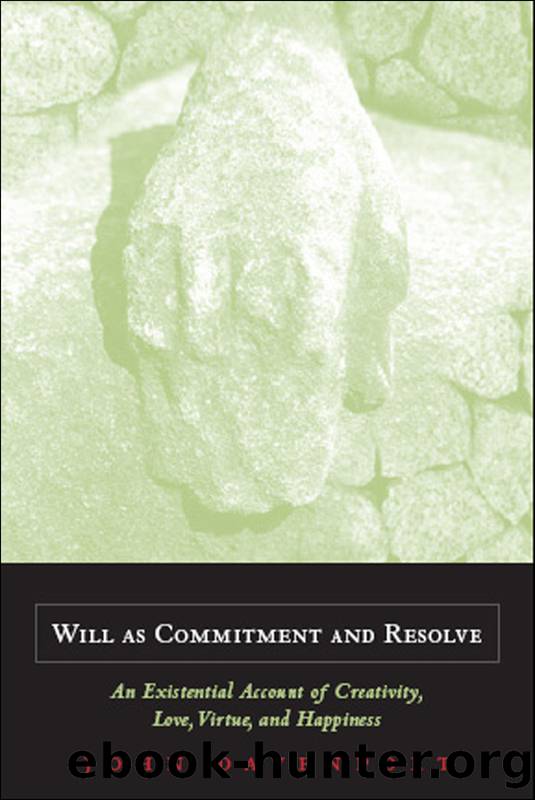Will As Commitment and Resolve by Davenport John J.;

Author:Davenport, John J.;
Language: eng
Format: epub
Publisher: Fordham University Press
Published: 2007-08-15T00:00:00+00:00
In this circumstance, the agentâs preference for the scenario following her lawsuit would seem irrational to the envious agent who prefers simple leveling, since the predicted outcome involves a larger relative difference between her holdings and her targetâs holdings.
Thus spite is not compatible even with complex versions of psychological egoism that make room for self-interested desires for relative or comparative goods even at the cost of some loss in noncomparative goods. The despiser cannot be explained as a complex egoist; she really does sacrifice her natural interests just as much as a charitable agent who intends no indirect benefit to herself. But the goal of her sacrifice is the true opposite of a charitable agentâs goal; namely, to cause her victim a significant loss as measured absolutelyâin my example, to deprive her of her dream wedding. Spite is like this; it wills to deny the victim his deepest hopes, fondest dreams, or most important pursuits in order to bring him to despair. It aims to destroy whatever its victim cares about most, just to spite her.
If spite is a motivational state in which the spiteful agent is bent on harming another person in this way, even if he can only achieve a little harm at great cost to everything else that should matter to him in life, no non-self-deceived judgment about his own happiness can produce such motivation. Once he is spiteful, of course, the agent can draw satisfaction from inflicting harm on his target, but only because he is antecedently committed to doing personal damage to his victim, even at a steep price to himself; thus the anticipated satisfaction is a by-product and cannot itself be the cause of this commitment. His spiteful motivation is pure in a way similar to the purity of agapic love: he is prepared to sacrifice his own well-being absolutely for the sake of his goal, and his goal is usually focused on the unique selfhood of another individual. For he attends with care to the details of the otherâs psycheâso as to personalize the harm all the more piquantly. It is difficult to see how such a goal could become anyoneâs end except by projective willing: spite is a volitional state. Still, the agent starts from reasons for such a project. The spiteful agentâs mission against the other person cannot be for no reason if it is autonomous; it must have some grounds, however inadequate they might seem to third parties. This can be illustrated by a series of popular examples.
(1) Shakespeareâs King Richard III utters many memorable lines, the first of which is: âsince I cannot prove a lover / To entertain these fair well-spoken days / I am determined to prove a villain.â90 Though it seems unlikely that anyone would so explicitly formulate their negative project, we could diagnose Richardâs problem as a simple case of envy: since he is deformed, he thinks that he cannot enjoy the goods of peaceful times, so he decides to deprive others of their happiness and cause war.
Download
This site does not store any files on its server. We only index and link to content provided by other sites. Please contact the content providers to delete copyright contents if any and email us, we'll remove relevant links or contents immediately.
The European History Highway: A Guide to Internet Resources by Dennis A. Trinkle Scott A. Merriman(494)
The Seven Wonders of the Ancient World by Michael Denis Higgins(477)
European Security in a Global Context by Thierry Tardy(470)
European Security without the Soviet Union by Stuart Croft Phil Williams(469)
The Routledge companion to Christian ethics by D. Stephen Long Rebekah L. Miles(458)
Hudud Al-'Alam 'The Regions of the World' - a Persian Geography 372 A.H. (982 AD) by V. V. Minorsky & C. E. Bosworth(399)
Gorbachev And His Generals by William C. Green(391)
Get Real with Storytime by Julie Dietzel-Glair & Marianne Crandall Follis(390)
Tibetan Studies in Comparative Perspective by Chih-yu Shih Yu-Wen Chen(385)
Governance, Growth and Global Leadership by Espen Moe(381)
Hyperculture by Byung-Chul Han(378)
CliffsNotes on Fitzgerald's The Great Gatsby by Kate Maurer(360)
The Oxford History of the World by Fernández-Armesto Felipe;(354)
How Languages Are Learned 5th Edition by Patsy M Lightbown;Nina Spada; & Nina Spada(353)
The Egyptian Economy, 1952-2000 by Khalid Ikram(352)
Oral Poetry and Narratives from Central Arabia: The Poetry of Ad-Dindan : A Bedouin Bard in Southern Najd (Studies in Arabic Literature, Vol 17) (English and Arabic Edition) by P. M. Kupershoek P. Marcel Kurpershoek(343)
The Oxford Handbook of the Incas by Sonia Alconini(333)
Europe Contested by Harold James(319)
The Hutchinson Dictionary of Ancient and Medieval Warfare by Peter Connolly John Gillingham John Lazenby(305)
